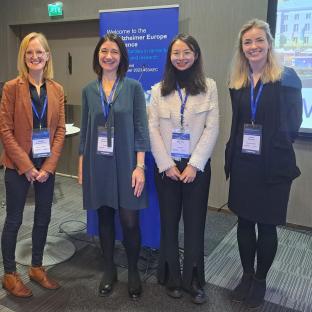Over the last decade, substantial efforts have been invested in the development of initiatives, resources and infrastructures for data sharing from clinical research studies. Data sharing has the potential to accelerate and advance dementia research, allowing scientists to make new discoveries using existing data from clinical cohorts, trials and registries. In a Special Symposium organised at the 33rd Alzheimer Europe conference in Helsinki, panellists showed how shared data has generated important insights on the causes, risk factors, diagnosis and treatment of dementia, discussing past challenges and future prospects. The concept of data sharing is not a new one: long before the advent of computers, health economists performed secondary analyses on data from government reports, and meteorologists shared information on weather patterns.
First, Sarah Bauermeister (University of Oxford), provided an overview of the Dementias Platform UK (DPUK) data sharing platform. DPUK gives researchers anywhere in the world access to high-quality, multi-modal data from 63 population and clinical cohort studies. Sarah also explained how analysis of shared data was able to reveal connections between early life adversity and mental health issues in later life, including depression, partner relationship strain, and poorer cognition.
The next speaker was Francesca Mangialasche (Karolinska Institutet), Executive Director of the World Wide FINGERS global Scientific Coordinating Center. The World Wide FINGERS network comprises research teams from over 60 countries across the globe, and Francesca detailed their efforts to harmonise global data from the FINGERS studies, to generate robust evidence on dementia prevention. The Alzheimer’s Disease Data Initiative is supporting permissioned, secure access to FINGERS study data via the AD Workbench – a data sharing platform that also powers the EPND (European Platform for Neurodegenerative Diseases) hub.
The third speaker in the special symposium was Sandar Aye (Karolinska Institutet). Sandar brought the health economics perspective, showing how data from the SveDem population registry can inform mortality and cost analyses for new dementia treatments. SveDem is a Swedish registry study that was initiated in May 2007, recruiting patients from memory clinics across Sweden. To date, over 100,00 patients with a dementia diagnosis have been included in the registry, with yearly follow-up.
Closing the special symposium, Stina Saunders (Linus Health and University of Edinburgh) brought the focus back to the participant perspective. Focusing on the European Prevention of Alzheimer’s Dementia (EPAD) longitudinal cohort study (LCS), Stina highlighted the valuable contributions of over 2,000 research participants from several countries in Europe. Thanks to their efforts, the EPAD-LCS has generated a valuable biobank and a vast, rich dataset, which is available on the AD Workbench.

